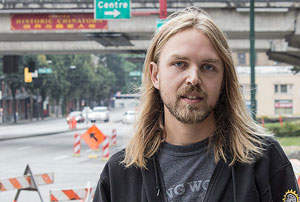
At first glance, Denis Chasse doesn't seem like the type to have a passion for education or union involvement.
But the moment the 26-year-old opens his mouth, his dedication to both becomes instantly clear.
Bearded, with flowing sandy hair, elaborate tattoos on both arms, and an enthusiastic, jovial manner, Chasse works forming and finishing concrete with the City of Vancouver. He's a member of CUPE Local 1004, an organization whose roots stretch back more than 100 years, and remain tightly entwined with the very beginnings of labour activism in Canada. And, as well as being one of only a small handful of 1004 members his age who regularly attends his union meetings, Chasse is part of Alive After Five, a program administered by the BC Federation of Labour, that takes him into local high schools to discuss both workplace safety and workers' rights.
"When I talk to these kids, they're always amazed by the fact that I'm young," he chuckles. "I walk in there, I have tattoos, I've got long hair... I'm kind of on their wavelength, which is really cool."
A painful lesson
Chasse, who grew up as part of a "really big family" in Squamish, moved to North Vancouver six years ago. He comes from strong union roots; his father has been a longshoreman for the past 13 years, working both in Squamish and at the Port of Vancouver. Chasse recalls being schooled in his youth on the benefits of union affiliation, but his original impetus to track down a union gig was the result of something much simpler: money.
"When I was at BCIT, I knew a guy who was in a union shop," he shrugs. "He was making 20-something bucks an hour, and I was making 10. And that's why I started working on the Sea-to-Sky highway. Because it was a union job, and I knew they made more money."
Work on the Sea-to-Sky soon led to a job with the City of Vancouver, a position obtained through a tip from a friend. However, this wasn't before learning a valuable -- and painful -- lesson in workplace safety, suffering a broken foot on the job, an injury incurred when he was asked by his boss to operate machinery with which he had no prior experience.
"I didn't know my rights," he admits. "Now I tell that story in schools, as an example of when you can say no."
Watching and learning
Chasse was hired in 2008, just before a round of departmental downsizing. He lived under the constant possibility of layoffs, while rotating through a number of different road crews operating out of the city yard at National and Terminal.
Finding his way to his current position forming and finishing concrete came about due to a combination of initiative and ability. "They said I 'had it'," he laughs. However, his involvement in workers' rights and collective agreements -- concepts he now champions -- came about more or less accidentally.
"I didn't do anything for about a year-and-a-half, two years," he says. "Like a lot of young people. You know how it is: just give me the paycheque, I wanna go party. And I was getting -- not screwed around -- but I felt like I was being treated unfairly at work. Not getting paid properly for work, things like that. So I talked to my Shop Steward, and he said 'Well, why don't you come to the union meeting and express how you feel?' So, I went to the meeting, and realized I was the youngest one in the room. There was one guy there who was even close to my age."
While the direction of the meetings was difficult to follow at first ("I sat through 10 union meetings before I started to know what was happening," he admits), the meetings soon led to an association with the BC Federation of Labour, first as part of the annual Young Workers' School at Camp Jubilee, and finally, as an educator with the Alive After Five program. And, as Chasse notes with a grin, his turn as an educator, like his union involvement, seems to have happened largely by accident.
"It was a young person reaching out to another young person," he shrugs. "Simple as that. I really didn't want to do it. But, I went to the training, and they kind of just pushed me into it. I guess they saw something in me... and now I love it. I love it."
By his estimation, Chasse has since visited 15 different schools, with hopes of visiting many more. However, as he admits with a sigh, his enthusiasm for getting involved doesn't necessarily spread among his coworkers.
"I've tried. I got one guy involved, but so far, they don't understand the importance of being involved in a union," he says. "They don't want to make a stink, because they think 'Oh, well, if I use these rights that I have, and if I bring up the collective agreement and say this is wrong, I'll get fired, or I'll get in trouble, or I won't move up.'
"So, they just keeps their mouths shut. A lot of people get union jobs for the money. They just want to move up, and collect their cheque. They're not necessarily there to make a difference."
A union with historic roots
Luckily for Chasse, his Local 1004, has historically been home to more than its fair share of agitators. City workers first organized in a semi-official capacity in March of 1911, calling themselves the Civic Employees Federal Union, and coming together at a time when the City of Vancouver, like many North American cities of the era, was already heavily polarized on the issue of unionism.
Early labour advocates, including the Industrial Workers of the World (colloquially known as the "Wobblies"), who had been holding demonstrations throughout the city since 1909, were demonized by industry leaders and the local media, first being written off as "Bolsheviks" and finally being forcibly dispersed during a series of increasingly violent riots in early 1912.
"Heavy whips and batons were freely used, and more than one man went down before the onslaught," reports the Jan. 29, 1912 edition of the Vancouver Daily News-Advertiser, on police tactics for dispersing a labour demonstration on Powell Street, before equivocating "although the weapons used did not inflict any very serious injuries."
In spite of this, the CEFU continued agitating for the rights of its workers, expanding to include bricklayers and plasterers in 1912. In 1917, the group, now known as the Vancouver Civic Employees Federal Labour Union (Local 28), received its federal charter.
In spite of this victory, early VCEFLU members remained a vocal part of the burgeoning labour movement, playing a crucial role in organizing and carrying out the first general strike in Canadian history -- an action which took place in August 1918.
It was a universal job action unlike any the city had seen before, and it very quickly turned violent; a mob of close to 300 marched on the headquarters of the Trades and Labor Council, assaulting several union activists, forcing two more to kiss a Union Jack, and twice attempting to throw VCEFLU President Victor Midgely out a window.
"This kind of thing will ruin the province," griped Minister of Parliament S.J. Crowe, in the pages of the Province. "If a few Red Socialists with pro-German ideas are going to run the whole country, it is about time we gave up, and believe me, I for one am not prepared to accept that proposition just yet."
Undeterred, the VCEFLU conducted a sympathy strike in 1919, in solidarity with the Winnipeg General Strike, as part of what is largely considered one of the most important job actions in Canadian history. As a result, many members were blacklisted, others were fired, and until protracted legal wrangling led to their reinstatement, membership was all but devastated.
The union itself was blacklisted as communist during the McCarthy Era, having its federal charter revoked in 1950, and initially excluded from the founding of the BC Federation of Labour, which refused to affiliate with "Communist-dominated" unions. The organization would remain independent for a further fourteen years. Then, in 1966, VCEFLU merged with CUPE (which had itself only been created three years earlier, through the merging of two other national unions, NUPE and NUPSE), and, thanks to nearly a year of CUPE negotiations, city workers finally won the right to be affiliated with the Canadian Labour Congress.
The road to responsibility
The CUPE of today is the largest public sector union in the province, boasting 80,000 members across a variety of trades. Local 1004, which celebrated its 100th anniversary two years ago, has more than 2,000 members. And as Chasse acknowledges, all of these freedoms have been gained through the active involvement of generations before.
"People before me fought for what I've got," he explains. "The 40-hour work week, things like seniority. I feel responsible -- if I don't stand up for that, I might just be contributing to losing it. I always hear people say that 'Oh, the union hasn't done anything for me.' But you're a union member. You are the union."
While public sector union density in B.C. remains higher than most other provinces, the lack of youth involvement Chasse mentions is far from just a perception. A recent study by the Business Council of BC shows that unionization, particularly among young workers, has dropped 49 per cent since 1981. But while standing up for his rights, and those of others, has occasionally caused friction with management ("there's a bit of a target on my back," he confides), there is no question in Chasse's mind that it's been worth it.
"These older guys who are 54, 55, 60 even, they're about to retire," he concludes. "All their fighting -- all these strong union guys, they're done. They've fought for the last 30 years: they've been shop stewards, they've sat in union meetings, they've been at the bargaining table, they've done all that stuff. They're out. And they need somebody new to take over. They're going to be passing the torch to us. And we've gotta be there." ![]()
Read more: Rights + Justice, Labour + Industry
















Tyee Commenting Guidelines
Comments that violate guidelines risk being deleted, and violations may result in a temporary or permanent user ban. Maintain the spirit of good conversation to stay in the discussion.
*Please note The Tyee is not a forum for spreading misinformation about COVID-19, denying its existence or minimizing its risk to public health.
Do:
Do not: